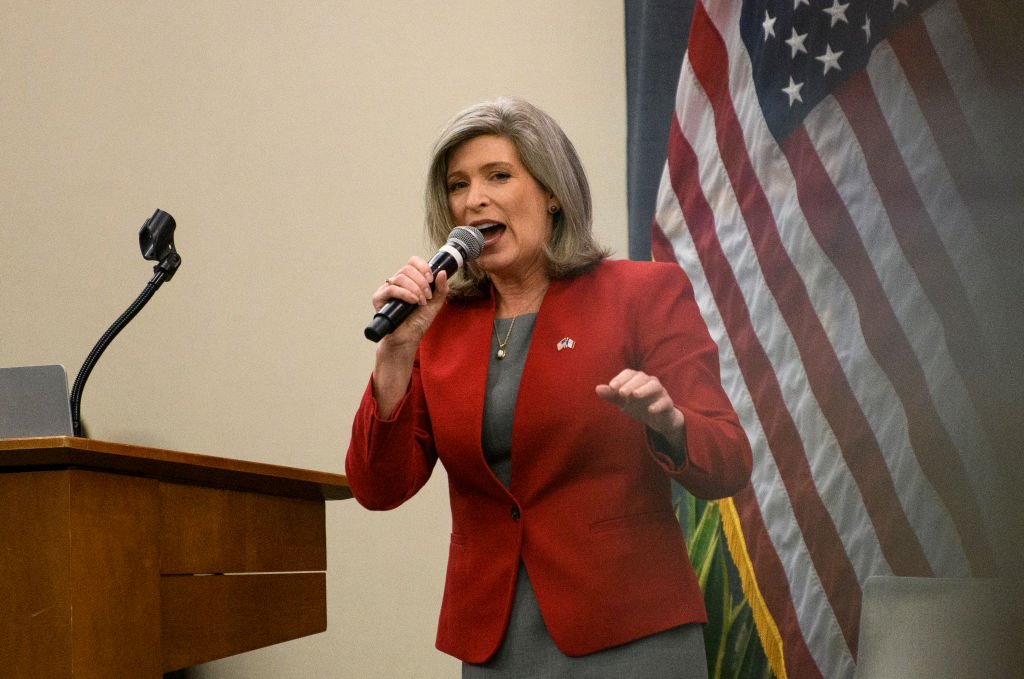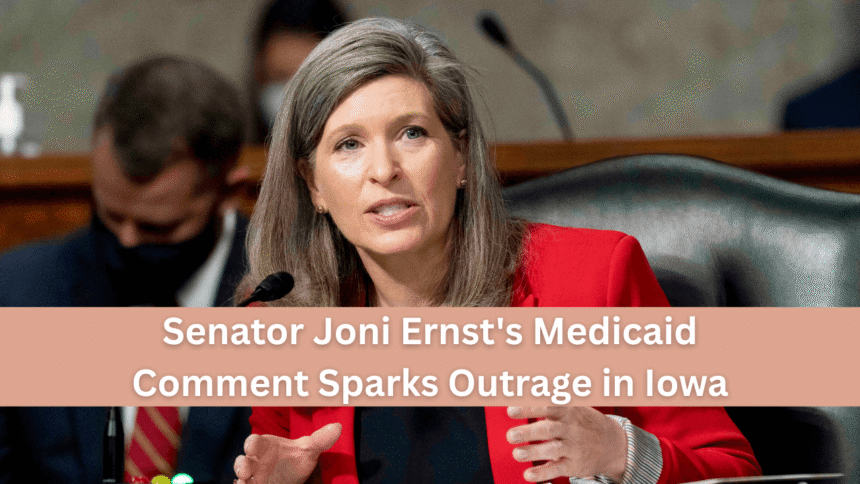A recent town hall meeting in Parkersburg, Iowa, turned tense and emotional as Senator Joni Ernst responded to a concerned citizen with a remark that has since drawn national attention. When questioned about potential Medicaid cuts in a bill she supports, Senator Ernst responded with the now-infamous words, “We’re all going to die.” That brief but shocking statement has ignited a wave of criticism, with some accusing the senator of being dismissive of serious concerns from her constituents.
The comment came as part of a broader discussion about the $700 billion spending and tax cut proposal recently backed by former President Donald Trump and supported by many GOP leaders in Congress. The bill includes significant changes to Medicaid and SNAP benefits, which many in Iowa rely on for basic health care and food assistance. Residents gathered at the town hall seeking answers — and reassurance — but what they heard left many stunned.
A Heated Exchange in Parkersburg
The incident occurred on Wednesday at a town hall attended by over 150 residents. The meeting began with the usual pleasantries, but it quickly escalated into a heated conversation when the subject of federal spending cuts was raised. Several constituents voiced their concerns about how the proposed bill would affect vulnerable populations, especially the elderly, disabled, and low-income families.
One attendee, a local nurse, emotionally described the difficult choices patients often face when access to care is limited. “People are already choosing between groceries and prescriptions,” she said. “Cutting Medicaid means more people suffer and, yes, some will die.”
That’s when Senator Joni Ernst delivered her controversial response: “Well, we’re all going to die.”
The audience responded immediately with gasps, groans, and even boos. What followed was a flurry of questions and criticism, with residents pressing Joni Ernst on whether she truly understood the stakes of her policy positions.
Political Fallout and Public Backlash
Within hours, video clips of the exchange were circulating on social media. Critics were quick to pounce on the remark, describing it as callous and out of touch. Many pointed out that as a representative of one of the most rural states in the country, Senator Joni Ernst should be especially aware of how crucial Medicaid is to the lives of many Iowans.

Democratic leaders condemned the statement, calling it “unacceptable” and “inhuman.” Iowa State Senator Sarah Trone Garriott tweeted: “Health care isn’t a luxury — it’s a right. Joni Ernst’s comment is a slap in the face to every struggling Iowan.”
Meanwhile, advocacy groups such as the Iowa Citizen Action Network and Protect Our Care launched online petitions demanding a formal apology. National figures, including some moderate Republicans, also weighed in, warning that such rhetoric could alienate voters ahead of the 2026 midterm elections.
The backlash has only grown in the days since. The phrase “Senator Joni Ernst’s Medicaid Comment Sparks Outrage in Iowa” trended on social media platforms including X (formerly Twitter), Reddit, and Facebook, as users shared stories of how Medicaid has impacted their lives or the lives of loved ones.
Ernst’s Response and Attempt at Clarification
In the wake of the controversy, Senator Joni Ernst issued a statement through her office clarifying that her remark was not intended to dismiss anyone’s concerns. “I regret that my words were taken out of context,” she said. “I was trying to convey the inevitable nature of mortality, not undermine the seriousness of health care access.”
She later appeared on a local radio program to further explain: “My point was not that we shouldn’t care — it was that we need to address these issues with long-term reform, not panic. I understand and value the role Medicaid plays, especially in rural areas.”
Despite her efforts to walk back the statement, many constituents remain unconvinced. “That kind of answer shows she’s not listening,” said Linda Gomez, a teacher from Waterloo. “We’re not talking about something abstract — these are our lives.”
The Broader Debate on Health Care and the Budget
This controversy has reignited a broader debate about the role of Medicaid and social programs in the U.S. budget. The proposed $700 billion bill, marketed by Trump allies as the “Big, Beautiful Bill,” aims to slash federal spending while cutting taxes — mostly for high-income earners and corporations. While supporters argue the plan will stimulate the economy and reduce the national debt, critics say it shifts the burden onto the most vulnerable Americans.
Health policy experts warn that cuts to Medicaid could result in reduced coverage, fewer services, and more uncompensated care at hospitals — especially in states like Iowa where rural hospitals are already struggling. According to the Kaiser Family Foundation, nearly 20% of Iowans are covered under Medicaid, including children, the elderly, and people with disabilities.
Dr. Paul Hanley, a health economist at the University of Iowa, weighed in on the issue: “Statements like ‘we’re all going to die’ trivialize the very real outcomes of policy decisions. It’s not just a budget line — it’s the difference between health and illness, life and death, for many families.”
Political Implications Moving Forward
The fallout from this town hall could have lasting consequences for Senator Joni Ernst, who is up for reelection in 2026. Although Iowa remains a predominantly red state, frustrations with GOP economic policies have begun to bubble up, especially among working-class voters.
“People want someone who listens, not someone who brushes off their fears with a fatalistic quip,” said political analyst Dana Rees. “It may not cost her the seat immediately, but it does damage to her image — especially with independents.”
The incident has also energized Democratic challengers, several of whom are now seizing on the moment to ramp up fundraising and outreach. Expect the phrase “Senator Joni Ernst’s Medicaid Comment Sparks Outrage in Iowa” to appear in campaign ads, mailers, and debates throughout the upcoming election cycle.
Final Thoughts
What happened at the Parkersburg town hall was more than just a viral moment — it was a reflection of growing dissatisfaction with how some politicians address real-life concerns. The statement “We’re all going to die” may have been meant as a rhetorical point, but it struck a chord with Iowans who feel unheard and underserved.
As the phrase “Senator Joni Ernst’s Medicaid Comment Sparks Outrage in Iowa” continues to circulate, it serves as a reminder that words — especially those from elected officials — carry weight, and the people listening expect compassion, not condescension.
Also, read about Taylor Swift buys back her music catalog.

